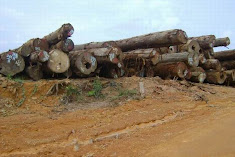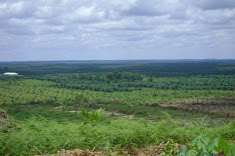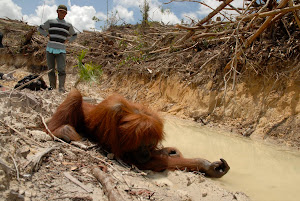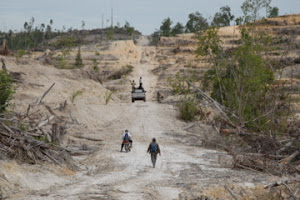Personal note:
In this very good article by Greenpeace I have highlighted something I've mentioned previously. It's pure madness that overseas governments, and now companies, give Indonesia vast sums of money to 'save' forests'. It is my view that the REDD carbon credit scheme will leave a lot of donors/investors poorer and RED faced.
--------------------------------------
Action by Greenpeace in the North Sea: Palm Oil that kills the climate and forests is Not Welcome
Greenpeace – December 24, 2008
Rotterdam, Netherlands
Greenpeace today protested against a shipment of Indonesian palm oil en route to Rotterdam by painting "Forest Crime" on the side of the Isola Corallo. The tanker is transporting palm oil from Indonesia's largest palm oil producer, Sinar Mas, to Europe and was already subject to a Greenpeace action six weeks ago in the port of Dumai in Sumatra, Indonesia.
Recent Greenpeace investigations (1) have brought to light information showing that Sinar Mas is actively destroying Indonesian rain forests and peat lands. While not itself a household name, Sinar Mas supplies to multinationals like Nestle, Pizza Hut and Burger King.
"Sinar Mas is a climate and forest criminal" said Suzanne Kröger, Forests campaigner, Greenpeace Netherlands. "Despite on-going discussions with Greenpeace, Sinar Mas continues to destroy Indonesia's last rain forests. Now is the time for companies like Nestle and Burger King to show their concern for the welfare of the planet by cancelling their contracts with Sinar Mas, otherwise they are supporting the ongoing destruction of some of the world's last remaining forests and thereby dramatically speeding up climate change."
Companies like Unilever, who also buy from Sinar Mas, are supporting the Greenpeace call for a moratorium on any further expansion of palm oil plantations in the remaining Indonesian rain forests. In addition to pushing for the moratorium, Greenpeace believes that companies now need to show that they are serious by cancelling contracts with companies like Sinar Mas that continue to deforest for palm oil in Indonesia.
Indonesia is the world's third largest emitter of greenhouse gases (after China and the USA) as a result almost entirely of deforestation. Not only is this a disaster for the climate and local biodiversity but also for indigenous communities who depend on the forests for their livelihood and for unique wildlife such as the endangered Sumatran tiger and orang-utan.
Bustar Maitar, Forest campaigner for Greenpeace Southeast Asia said "If the Indonesian government doesn't take urgent action now, millions more hectares of pristine forests will be cut down and burnt. They also need to stop their hypocrisy: first they sell concessions to companies who have a long-standing record of forest decimation and then they ask the international community for funds to protect the very same forests. In order to qualify for funds to save their forests, the government must implement a moratorium on any further deforestation so that companies like Sinar Mas don't cut down all of the trees before the money can reach the forests."
Greenpeace's "Forests for Climate" funding mechanism for forest protection was presented at the Poznan climate talks earlier this month. The document is a blueprint for the international community to establish funding for tropical forest protection as one of the major steps in the fight to curb climate change. Countries like Indonesia are hoping to get financial compensation for their attempts to reduce deforestation, meanwhile Sinar Mas's expansion plans include the conversion of almost 2 million hectares of pristine forest in Indonesia's Papua provinces as well as further forest clearing in Kalimantan and Sumatra.























-a.jpg)
